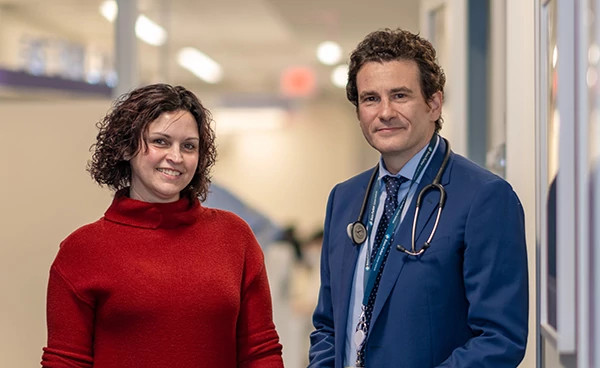Clinical trials are scientific studies designed to test new treatments — such as drugs, diagnostic procedures, and other therapies — in people to determine their safety and effectiveness. Nearly all cancer drugs in use today have undergone testing in clinical trials.
Cancer Clinical Trial Types
At Dana-Farber, we offer a variety of clinical trials, each serving a unique purpose in the fight against cancer. By participating in these diverse types of clinical trials, patients play a crucial role in advancing cancer research, helping to pave the way for new discoveries and improved care for future generations.
Here's an overview of the different types of clinical trials available:
Treatment Trials
These trials focus on testing new treatments, such as cancer drugs, surgical procedures, or radiation therapies. They aim to find more effective ways to treat cancer or manage its symptoms, offering participants the potential for direct health benefits.
Non-Treatment Trials
Prevention Trials: These studies explore methods to prevent cancer in individuals who have never had it or to prevent a recurrence. They may involve medications, lifestyle changes, or other interventions, contributing to long-term cancer prevention strategies.
Screening Trials: Aimed at discovering new methods for early cancer detection, these trials evaluate the effectiveness of various screening tests and procedures. While participants may not receive immediate benefits, their involvement helps improve early detection for future patients.
Diagnostic Trials: These studies seek to enhance the accuracy and timing of cancer diagnoses. Participants contribute to research that aims to improve diagnostic methods, potentially leading to earlier and more precise detection.
Supportive Care Trials: These trials focus on improving the comfort and quality of life for cancer patients and survivors. They explore ways to manage symptoms, side effects, and overall well-being, enhancing patient care beyond direct treatment.
Genetic and Biomarker Trials: These trials investigate the role of genetic and molecular markers in cancer. They aim to tailor treatments based on individual genetic profiles, leading to more personalized and effective care. While they can be therapeutic, they often gather information to inform future treatment strategies.
Biobanking Studies
In these studies, biological samples such as blood, tissue, or DNA are collected and stored for future research. Participants contribute to a valuable resource that enables researchers to study cancer at a deeper level, potentially leading to breakthroughs in prevention, diagnosis, and treatment.
Cancer Clinical Trial Phases
Clinical trials follow distinct phases or steps — each with a specific purpose — to ensure the safety, efficacy, and overall impact of the treatment.
Phase 1 Trials
Focus: Safety and Dosage
Types: Treatment Trials
Phase 1 trials are the first to evaluate a drug in humans after proving effective in laboratory studies. They are designed to determine the safety of a new cancer therapy, involving a small number of patients — usually around 20 to 100. The drug is administered first in low doses, increasing to find the dose that can be given safely without causing severe side effects.
These trials are crucial for therapeutic trials aiming to introduce new treatments and establish a safe usage protocol.
Phase 2 Trials
Focus: Efficacy and Safety
Types: Treatment Trials, Genetic and Biomarker Trials
Phase 2 trials enroll as many as several hundred patients to see how the treatment works in certain types of cancer. Researchers look for benefits such as shrinking cancer, prolonging the period when cancer doesn’t progress or come back (recur), or helping people live longer than they would without the treatment.
These studies continue to assess patient safety and are essential for treatment trials that have shown promise in Phase 1. Phase 2 trials may also include genetic and biomarker trials if they aim to better personalize treatments based on individual profiles.
Phase 3 Trials
Focus: Comparison with Standard Treatments
Types: Treatment Trials, Supportive Care Trials
Phase 3 trials compare new treatments with the current treatment standard to determine which is safer and more effective. This phase may involve hundreds of patients at many treatment centers, and is the last, crucial phase before a new treatment is approved for general use. Participants are often randomly assigned (randomized) to receive either the standard treatment or the new treatment, and when possible, neither the doctor/researcher nor the patient knows which treatment is being administered — a method known as a double-blind study.
If a new drug or treatment is determined to be more effective or safer than the current treatment, an application is submitted to the US Food and Drug Administration (FDA) for approval. The FDA reviews the data collected during the study and decides whether to approve the treatment for wide use, potentially establishing it as the new standard treatment.
Phase 3 might also include supportive care trials if they aim to demonstrate improvements over existing supportive care methods.




